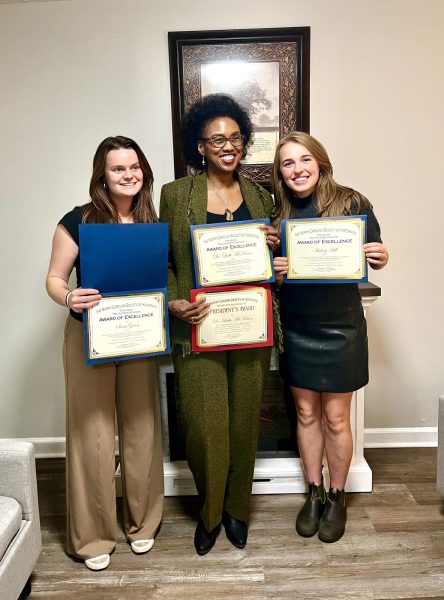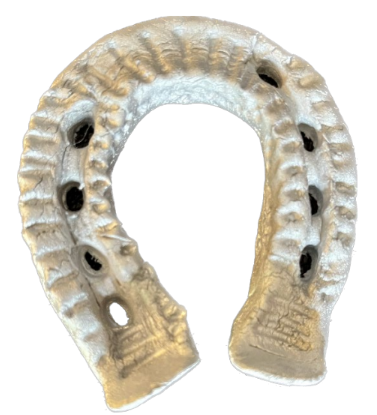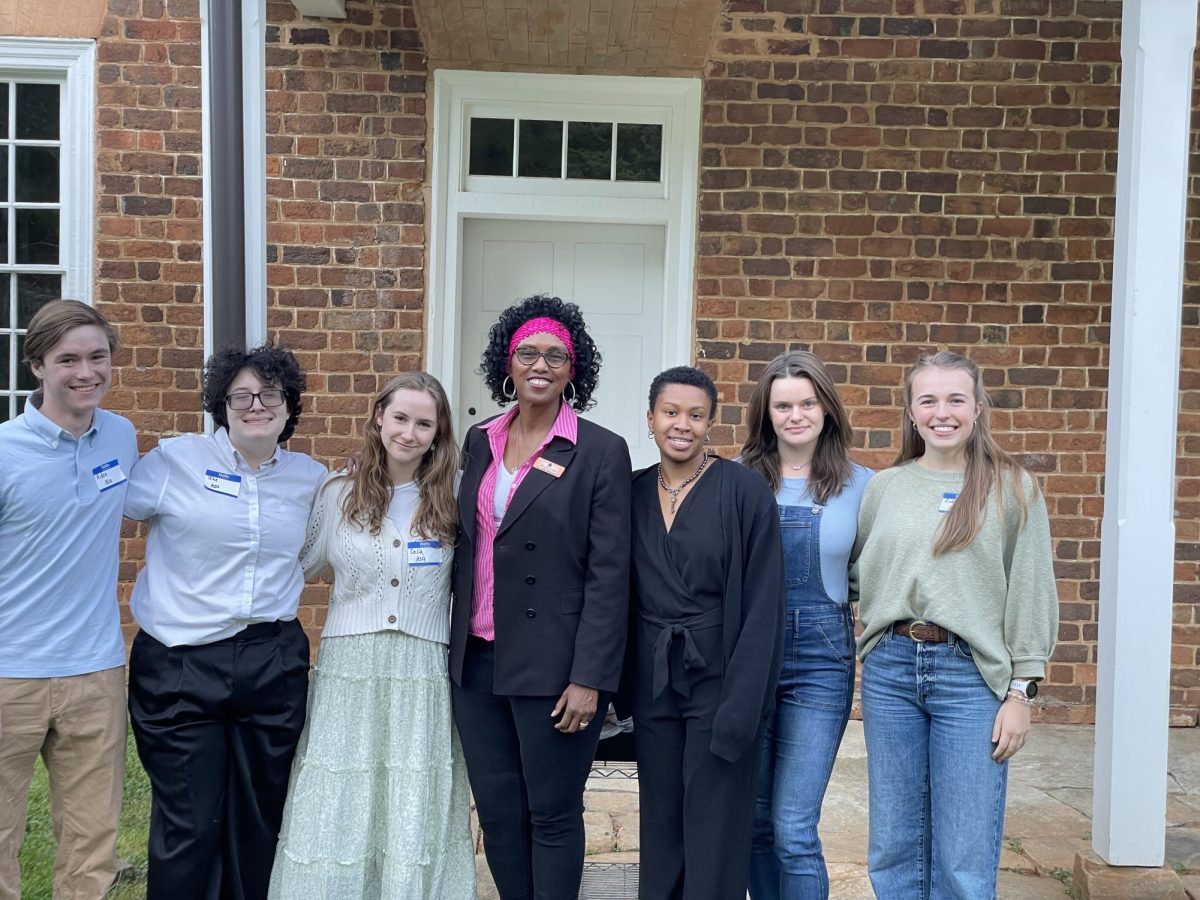On the McDowell Plantation in Morganton sat a brick marred with fingerprints. It was unearthed during a restoration. The prints were so distinct, one could fit their fingers in the grooves left behind. This brick immortalizes the presence of enslaved people in Appalachia.
The written existence of enslaved people in Burke County was lost to time. Poor record keeping and inaccuracies perpetuated by the slave owner Charles McDowell, ensured their histories were erased. Most documentation from the McDowell Plantation features the white slave owners rather than the enslaved people who built, managed and bled on the property.
Last spring, Interdisciplinary Studies adjunct instructor Leslie McKesson and her honors IDS 3540 Antebellum Slavery in Appalachia class visited the McDowell Plantation as part of their semester-long project uncovering the experiences of enslaved people in Appalachian communities.
On Oct. 7, an exhibition entitled “Shadows of a Time Gone By,” in partnership with the Historic Burke Foundation, showcased the students’ work at the Burke County Courthouse. For the collection, the students received the North Carolina Socie
ty of Historians’ Award of Excellence and McKesson won both the Educator of the Year Award and the President’s Award.
In her class, McKesson said she wanted to emphasize the personalization of slavery, telling stories from the perspective of enslaved people and abandoning the shallow image society held of what enslaved people were.
For their semester-long assignment, students were asked to interpret the lives of the enslaved on the McDowell Plantation and create a narrative surrounding their person. The names were taken from the partial records from the plantation.
McKesson also invited guest speakers to cross-examine and fact-check the students’ work. The students then transformed their written work into a performance piece for the exhibition.
“We wanted to show how they engaged in acts of emancipation, even as enslaved people, what were some of the things that they did to have little moments of personal freedom?” McKesson said.

Humanization, dignity, agency and self-emancipation were the pillars McKesson said she wanted her class to feature within their presentations at the McDowell House.
Pulling from documents in Burke County, McKesson’s class had to read between the lines to gather information on the authentic depiction of enslaved lives. Students had the opportunity to connect with the descendants of enslaved people in Burke County.
Scout Green, a junior public health major, enrolled in Antebellum Slavery in Appalachia to “unlearn the falsehoods” about slavery in the Appalachian region. Her project centered on an enslaved girl Delilah, often referred to as Cherry, a child who found love in music.
“It was interesting figuring out how to tell her story from the perspective of someone realizing she would not get to accomplish her dreams,” Green said. “She was a child so she did not have a complete understanding of the world and her place in it. It was honestly heartbreaking to make her painfully realize it as her story continued.”
Professors across disciplines critiqued the class’ narratives to further the truth about the lives of the enslaved.
“As I brought Cherry to life through research, writing, and deeply informed imaginings, I compared my own idyllic childhood to the vastly different ones lived by thousands of ‘Cherrys,’ children lost, forgotten, abused, enslaved, whose stories will never be told, whose songs will never be sung,” Green said.
In Green’s poem “Lark,” Cherry longs for a life she has dreamed of. Anguish and desperation for freedom are the focal points in Cherry’s narrative.
Green writes:
He smiles and we pretend not to cry.
The big house, it grows; but I can’t go inside.
We make his candles; but we stay in the dark.
He is my cage; I am his lark.
Visiting the plantation sparked an entirely new emotion in Green, who originally saw the McDowell land through virtual tours and photographs.
“Standing on the property brought the gravity of our class and research to a new level of visceral realness,” Green said.
The exhibition garnered attention from historians and Burke County residents alike. In addition to the written and performance component, a handmade artifact accompanied each project.
“It was incredibly emotional, and I actually cried while talking about how this project impacted me personally,” Green said.
Celia Merrifield, a sophomore anthropology major, described her experience in Burke County as “evocative” and “eye-opening.”
“It was so poignant and just very sad to think that like what those people had been through,” Merrifield said. “I remember us, all of us were sitting there kind of like feeling. It’s just a strong, strong feeling.”
Merrifield based her project on the letters of Albert McDowell, an enslaved miner sent to California to excavate gold during the California Gold Rush.
“In a similar way to the brick, it’s a very concrete example of like, here’s someone who lived and worked and wrote these letters and sent them,” Merrifield said. “For me, that was very important to the writing of the story.”
By the end of the drafting process for the presentation, all of the character narratives were intertwined either through familial connections or interactions around the plantation.
“Being able to incorporate that kind of human aspect I feel, it’s very important to emphasize,” Merrifield said. “These were real people just living real lives and having likes and dislikes.”
Excluding McKesson, Stevie Watson was the only Black student in the class. They said they felt “kind of weird” because of their place at a predominantly white institution.
Watson said their anxieties diminished once they witnessed how respectful, engaged and open their classmates were.
The McDowell Plantation, although stripped of its original slave quarters, grounded Watson’s narrative and experience in the class.
By the end of Watson’s visit to the plantation, they said everyone was emotional.
“The house was still very much intact. Inside, they had to like redo a couple of times, but they still have the sugar chest there. They still have, I think, this one mantle that I was, like, obsessed with because the carvings are just so intricate,” Watson said.

Watson’s character, Milton McDowell, was bought by Charles McDowell at the age of 12 and trained to be a blacksmith. Milton McDowell’s father gave him a horseshoe before he was sold as a remembrance of the life he was robbed of. As part of their narrative, Watson said Milton McDowell slept with the horseshoe under his pillow.
Watson credits the success of the class to McKesson, whose passion and dedication to her class reached beyond the standard honors seminar.
“A lot of times she was, like, very much involved in everything and she was just always excited. She was always coming up with new things every single time we met,” Watson said.
McKesson said she examines the experiences of enslaved people as a duty to combat myths surrounding slavery and the role of Appalachia within the transatlantic slave trade.
“There’s a lot of discussion going on about how to discuss slavery, there is a spin put on slavery that it benefited people of African descent and, you know. There are truths, I think that could be obscured,” McKesson said. “Education allows that to be the framework in which slavery is taught. And I think it’s important that we share information like this, even if it’s beyond the ethical educational space, even if it’s in museums, or you know, wherever that information can be shared, to be sure that people know the realities.”
A non-honors section IDS 3540 Antebellum Slavery in Appalachia has returned for the spring semester, focusing on Fort Defiance in Caldwell County, North Carolina. The class will meet on Mondays from 5-7:30 p.m. In Fall 2024, McKesson will teach HON 2515: Children of the Struggle: Desegregation in an Appalachian Town. No prerequisites are required for either section.
Correction: A previous version of this article stated the spring 2024 IDS class is an honors section. IDS 3540 Antebellum Slavery in Appalachia is open to non-honors students. Fall 2024 will offer the honors seminar HON 2515: Children of the Struggle: Desegregation in an Appalachian Town with Dr. Leslie McKesson. This was fixed in the article.


